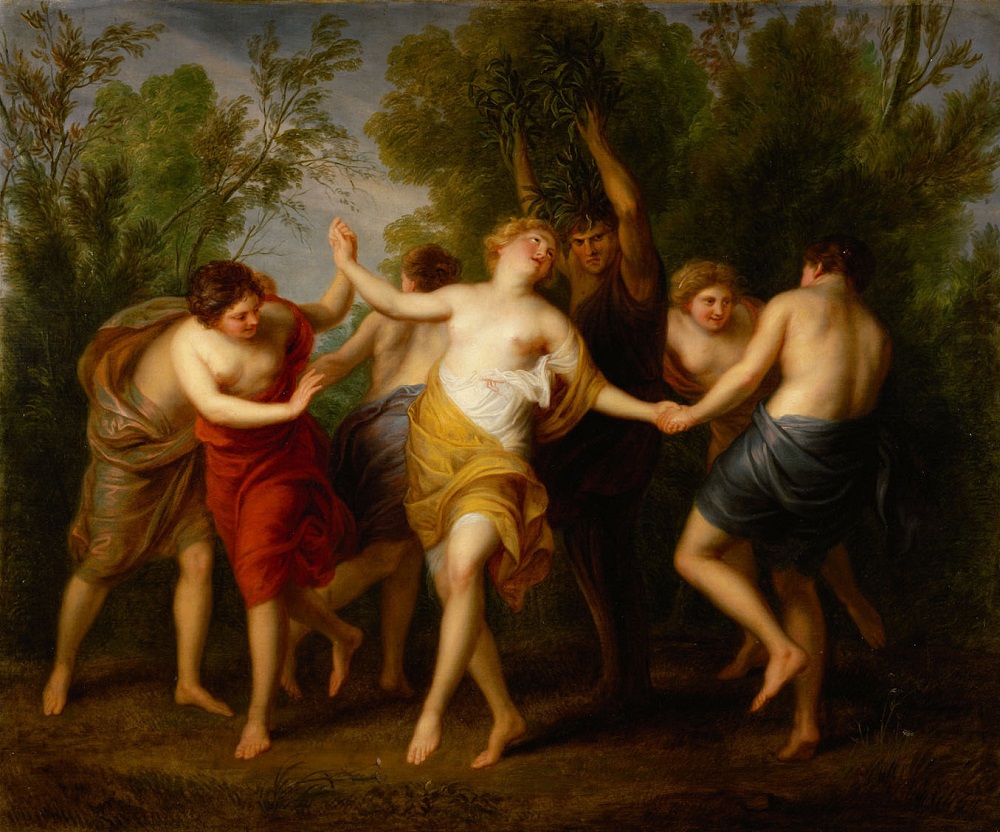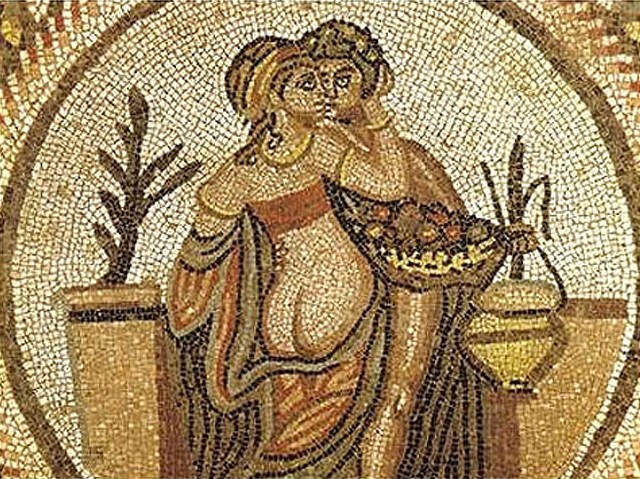This is the second of two articles corresponding to the three parts (books) of The Art of Love:
a. How to seduce and keep women (Book 1 & 2)
b. How to seduce and keep men (Book 3)
Read the following as an introduction before you continue: Why Ovid’s Ars Amatoria is a challenging book to read?
Disclaimer: Unfortunately some of us need this reminder: A few of Ovid’s instructions are outdated and immoral, and some are even worse. If you sexually force yourself on a woman (or take advantage of her while she’s passed out drunk), not only will your amorous pursuit be over, but you’d also be considered a rapist!
It’s time to teach women:
Having armed Greeks against Amazons, I must now prescribe
Weapons, Penthesilea, for you and your tribe.
[…]
“But why give venom to snakes? Why betray
Our sheepfold to wild she-wolves?” you may say.
Don’t smear the whole sex with the disgrace
Of the few who are bad, judge each as a separate case. 1Ovid, The Art of Love, trans. James Michie (New York: Modern Library, 2002), 111.
This unfortunate attitude to courtship is not unique to Ovid. Comparing courtship to a war means one side has to lose, must be conquered. Of course, that was always the women’s camp. That view was prevalent in written and oral cultures around the world. Today, we could go for better metaphors: a dance, for example, where both partners could equally participate and enjoy.
Women, while your youth lasts, don’t reject lovers:
Never forget that old age
Will arrive, never let time
Slip from you, wasted. While you’re in your prime,
While you still can, have fun, play,
For the years like water run away,
The river glides, the hour moves on,
And are irrevocably gone.
Youth should be used, it vanishes so fast,
And pleasures to come will be less than pleasures past.
Those grey ghosts I remember as a violet-bed,
Those thorns were once a gift, a rose-wreath for my head.
You who now lock your lovers out—grow old,
And you’ll lie alone at night, feeling the cold,
Your door no longer battered
By midnight drunks, your threshold never scattered
With dawn roses. Oh yes, it’s sad
That flab and wrinkles come so soon, too bad
When the radiant complexion you once had
Fades, and the streaks you swear
You always had as a girl are suddenly everywhere—
A whole head of grey hair!
[…]
Moon, when over Mount Latmos you had a crush
On Endymion, you felt no need to blush,
Nor was there, Aurora, in your eyes
Any shame in making Cephalus your prize.
Though Venus still mourns Adonis, all the same
She bore two children with a different name.
Follow the role models in the sky,
Earthbound women, and don’t deny
Your pleasures to hungry men. They may abuse
Your trust. So what? What have you got to lose? 2Ibid., 115-117.

Don’t neglect your body hair:
A few words to guarding against underarm “goat”
And bristling, hairy legs, but I’m talking to girls finer
Than the peasants in north-west Asia Minor
Or the rocky Caucasus. 3Ibid., 125.
Removal of female body hair could be traced to well before Rome, all the way to Greece and Egypt before it.
Be reasonable with make-up and never let anyone see you apply it:
[D]on’t let your lover see the boxes and jars
On your dressing-table—remember, ars
Est celare artem. The average man feels sick
At the sight of make-up put on so thick
That it melts and runs down a sweaty neck.
As for that facial grease
Extracted from an unwashed fleece,
Even though it’s “from Athens” it will offend
All noses. Nor can I recommend
Dabbing hind’s marrow cream on your face
Or cleaning your teeth in a public place.
It may improve your looks, but it doesn’t make good viewing.
[…]
While you’re at your toilet; women should keep,
Till the work’s perfected, out of sight.
Do I have to know why your complexion’s white?
Shut the boudoir door—why show
A half-finished painting? Men don’t need to know
Too much; most of what you do
Would shock us if it weren’t concealed from view.
The splendid statues in our theatres—you would sneer
If you looked at them closely: wood with gilt veneer.
That’s why the public aren’t allowed near
Until the work’s completed,
And why, too, we men shouldn’t be treated
To the sight of you making up. I don’t ban
Combing your hair out in front of a man
So that it ripples down your back, but take care
Not to lose your temper trying to repair
Knots and tangles. 4Ibid., 125-127.
Ars Est Celare Artem means it is an art to conceal art.
Learn to conceal the flaws of your body:
A flawless face is rare:
Mask your blemishes as best you can, take care
To hide your body’s faults. If you’re dumpy, sit in a chair
(You could be taken for seated if on your feet!),
Or stretch yourself, however petite,
On a couch, legs under a wrap, out of sight,
So inquisitive eyes can’t estimate your height;
If you’re scrawny, go in for thick-woven, profuse
Garments, a robe hanging loose
Over the shoulders; if your skin’s pallid, puce
Stripes are the answer; if it’s swarthy, make use
Of white, contrasting linen from the Nile;
If you’ve ugly feet, conceal them in buskin-style
Bootees; if your calves are too lean,
Keep them confined, don’t let them be seen;
Pads help jutting shoulder-blades, and a bra is a must
For a flat bust;
If your nails are rough and your fingers fat,
Don’t gesticulate; if your breath’s bad, never chat
On an empty stomach, and leave a good space
Between your mouth and your lover’s face;
If you’ve a tooth that’s black, protruding, or askew,
To laugh’s a fatal thing to do.
Would you believe it, women study even the act
Of laughing! That, too, calls for tact.
The mouth should be opened only so wide,
The dimples kept small on either side,
And the top teeth at the tip
Just covered by the lower lip—
No interminable, side-splitting
Merriment, but a sort of light trill, as is befitting
To their sex. Whereas one girl will twist her
Face into a grotesque guffaw, her sister
Will stagger about bent double
So you’d think she was weeping in real trouble,
While a third emits a raucous, unpleasing sound
Like the bray of a donkey pushing the millstone round. 5Ibid., 129-131.
Although his advice on hiding unattractive features could be seen as crude, it’s not entirely different from that published in modern magazines.
Women should learn to walk properly:
Learn how to use your body as a woman should:
The walk is a part of sex-appeal at which you can’t scoff—
It turns a stranger on or puts him off.
A. sways her hips skilfully, lets her robe flow and flare
With the welcomed air,
An arrogant, mincing charmer;
While B., like the sun-reddened wife of an Umbrian farmer,
Has a huge, gawky stride.
But here, as in most things, moderation should preside—
One woman moves like a bucolic spouse,
The other more decadently than taste allows.
In spite of which, by all means flaunt the charm
Of a naked upper right arm—
It especially suits you girls whose flesh is white;
Just the sight of a shoulder like that makes me long to kiss and bite! 6Ibid., 133.
Women should learn how to sing:
The Sirens, those bird-women of the main,
With their sweet voices could detain
The swiftest ship. Ulysses, though bound fast,
Almost wrenched himself free of the ropes round the mast
When he heard their song (the rest,
Ears plugged with wax, stayed self-possessed).
Song is a seductive thing:
All women should learn how to sing—
In many cases
The voice is as good a procuress as the face is. 7Ibid.

Women should learn to play musical instruments:
An educated (my way) girl won’t lack the skill
To handle both the strings and quill.
When Orpheus touched his lyre, the sound
Moved rocks and beasts, and held spellbound
The rivers of Hell and the three-headed hound;
And when Amphion played
(That noble avenger of his mother’s shade),
Stones leapt gladly to form new walls for his city.
Even a dumb dolphin was moved to pity
By Arion’s lyre—you know the famous fable.8Ibid., 133-135.

Women should learn poetry:
Know your poets: Callimachus, Philetas, and the bard
From Teos, that old man who drank so hard,
And Sappho (have you ever read such sexy verse?),
And Menander whose duped fathers always curse
Rascally slaves. Read tender Propertius; read Gallus;
And quote, of course, from you, Tibullus;
Read Varro’s epic tale of ancient Greece,
The Argonauts, about the golden fleece
Which brought poor Helle little joy;
Read the Aeneid, whose hero fled from Troy
And from whose settlement towering Rome has sprung—
The noblest poem in our Latin tongue.
Who knows, one day my name may rank among
Theirs, and my works succeed
In escaping Lethe 9Ibid., 135.
Lethe (pronounced LEE-thee) is one of the five rivers of the underworld (Hades) and it means oblivion or forgetfulness.
Women should learn to dance and play board games:
Yes, you’ve guessed right, I’d have every girl enhance
Her image by knowing how to dance,
So that when wine’s poured and guests call for an act,
She can oblige. Why not? Stage stars attract
Applause, such are the ballet’s charms,
By the sinuous movements of their hips and arms.
I feel ashamed to offer advice
About trivia, but girls should play knucklebones and dice
And board-games. 10Ibid., 137.
Join the crowds to find a lover:
You pretty girls, a crowd pays—join the group,
Cross your threshold, get around. The she-wolf stalks the troop
To seize one sheep, the eagle aims its swoop
At a flock of birds. A beautiful woman should show
Herself in public: you never know,
Out of the ruck
One man may spot you and be struck.
To be admired, be seen all over the place,
Devote great care to your figure and your face.
Luck plays a big part. Keep your fish-hook dangling—
They’re where you least expect them, when you’re angling. 11Ibid., 141.
Beware of playboys:
But steer clear of the young professor
Of elegance, the too good-looking, snappy dresser
Who’s always arranging his hair—he’ll tell you a stale,
Thousand-times-told tale;
His heart’s a gypsy, it camps, it moves.
What can a woman do when the man she loves
Is smoother than she is and, for all she can tell,
Has more men than she does as well?
It’s hard to believe, but it’s true, Troy would have stayed
Unsacked had Cassandra’s warnings been obeyed.
Some men conduct their siege under a disguise
Of passion in order to lay hands on the prize—
A shameful ploy. Don’t be fooled by his sleek,
Scented hair, tight-laced shoe-tongues, chic,
Fine-textured togas, or the ring
(Single or plural) glittering
On his hand. 12Ibid., 143.
If you find a man’s gift pleasant, let him take you to bed:
If a man’s made a fair offer, said it
In so many words, then promise in the same measure
And, if he pays, meet your side of the bargain of pleasure.
The girl who takes a gift and doesn’t honour
The pact could loot the shrine of Isis, give belladonna
And hemlock to a lover, cause the undying fire
Of the Vestal Virgins to expire! 13Ibid., 143-145.
Ovid compares ungrateful women who do not give in to sex after receiving gifts to the sacking of the shrine of Isis (an Egyptian goddess worshiped by the Greeks and Romans). These women, he continues, might as well give poison (hemlock) to their lovers or put out the sacred fire of the Vestal Virgins.

Play tricks on him to stir his jealousy:
Lock him out, let him camp rough
Outside your door (“oh, cruel door!”) and plead
And threaten till he’s blue in the face. Men need
Variety, we all enjoy
The jolt of bitter flavours; sweet things cloy;
Sometimes a skiff’s upset by favouring winds:
That’s why a woman often finds
Her husband’s ardour falling below scratch—
He has too easy access, the key of the latch.
[…]
A game horse performs best in a race
When the field’s ahead of him, and he has to chase
And overtake. Resentment fans a failing fire—
I myself, I confess, can only feel desire
Under the stimulus of some hurt.
But it mustn’t be too gross or overt:
Let your lover worry away and always suppose
Much more than he knows.
Pretend your husband’s a jealous bore, that a spy,
Some scowling slave, is keeping an eye
On all you do—and he’ll be thrilled. Unalloyed,
Unmixed with danger, pleasure’s less enjoyed.
Though you’re as free as any courtesan,
Appear scared. Though the door’s safe, have the young man
Climb in through the window, while you act afraid.
Then arrange for a well-rehearsed maid
To burst in later, crying, “All is discovered!”
And hustle the quaking boy into a cupboard.
All the same,
In case he decides the nocturnal game
Isn’t worth the candle, dilute fear with a measure
Of pure, worry-free pleasure. 14Ibid., 153-155.
Hiding your lover in a cupboard is a clear example of Ovid’s jokes and is not meant to be taken seriously.
Mind your manners while eating and drinking:
Handle your food
Tidily, good
Table manners matter—it’s a disgrace
To smear sauce all over your face.
Don’t snack at home first; equally, don’t indulge in greed:
Eat just a little less than you need.
If Paris had ever seen
His Helen guzzling, he’d have thought, “I’ve been
A fool—my prize looks quite obscene.”
It’s far more suitable, I think,
And more attractive, for a girl to drink,
For Cupid and Bacchus, love and wine,
Tend to combine
Successfully. Last, if you have a strong head, you’ll have no trouble
With your brain and your legs—but on no account see double.
A drunk, sprawling woman’s a revolting sight;
Whoever has her, serve her right.
And when the table’s cleared, don’t nod off, keep
Alert—gross things can happen to a girl asleep. 15Ibid., 165-167.
Stay clear from Ovid’s advice here: if she’s drunk “whoever has her, serve her right.” Generally, having sex under the influence of alcohol delves into the grey area of whether it’s consensual. But what Ovid is describing above is a woman so drunk she’s lying sprawled. Sex in that case is rape!
Find out which sex position suits you best:
The rest I blush to write, but kind Venus can claim,
“I’ve a special concern for what you’re shy to name.”
Each woman should know herself, and in the act of sex
Adapt her body for the best effects.
No one method is best
For everybody. If you’re blessed
With a pretty face, lie supine in the sack;
If you’re proud of your back,
Then perform the act
Like a beast, two-backed,
And offer a lovely rear view to beholders.
[…]
If you’ve fine, long flanks, kneel on the bed,
Neck arched, head
Back-tilted. If you’ve perfect breasts and youthful thighs,
Have your lover stand, and you lie down slantwise.
Never blush to loosen your hair and let it float
Wild, like a maenad’s, round your arching throat.
If your belly shows stretch-marks, then turn over
And offer your lover
A rear engagement, as the Parthian cavalry might.
Love has a thousand postures to delight:
A simple one, and the least physically trying,
Is on the right side, half-sitting, half-lying. 16Ibid., 167-169.

Every woman should enjoy orgasms, but when you can’t have it, fake it:
If nature hasn’t given
You the knack of orgasm, just make it
Sound as if you were coming, fake it.
(Unlucky the one who’s numb there, not to enjoy
What should be the birthright of both girl and boy.)
But take care that your bluff
Isn’t seen through. Lay on convincing stuff—
Writhing body, rolling eyes,
Gasps and ecstatic cries,
All the signs of pleasure—though, I’ll risk saying it,
That secret part has its way of betraying it
Girls who demand an after-sex gift can’t expect
Their “pretty pleases” to have any effect.
Oh, and don’t bare all the windows to the light:
Much of your body’s best kept out of sight. 17Ibid., 169.
This is the second of two articles corresponding to the three parts (books) of The Art of Love:
a. How to seduce and keep women (Book 1 & 2)
b. How to seduce and keep men (Book 3)
You might also like:

Ars amatoria: Controversial advice on love, sex and date rape from ancient Rome
Why The Art of Love by Ovid was repeatedly censored: burnt in Florence, banned in England and seized in the U.S.?
BOOK: THE ART OF LOVE

Read Ovid’s immoral dating guide for a balanced insight into the #MeToo movement
The Art of Love shows how the courtship game, once played by all, has changed
BOOK: THE ART OF LOVE
Endnotes





